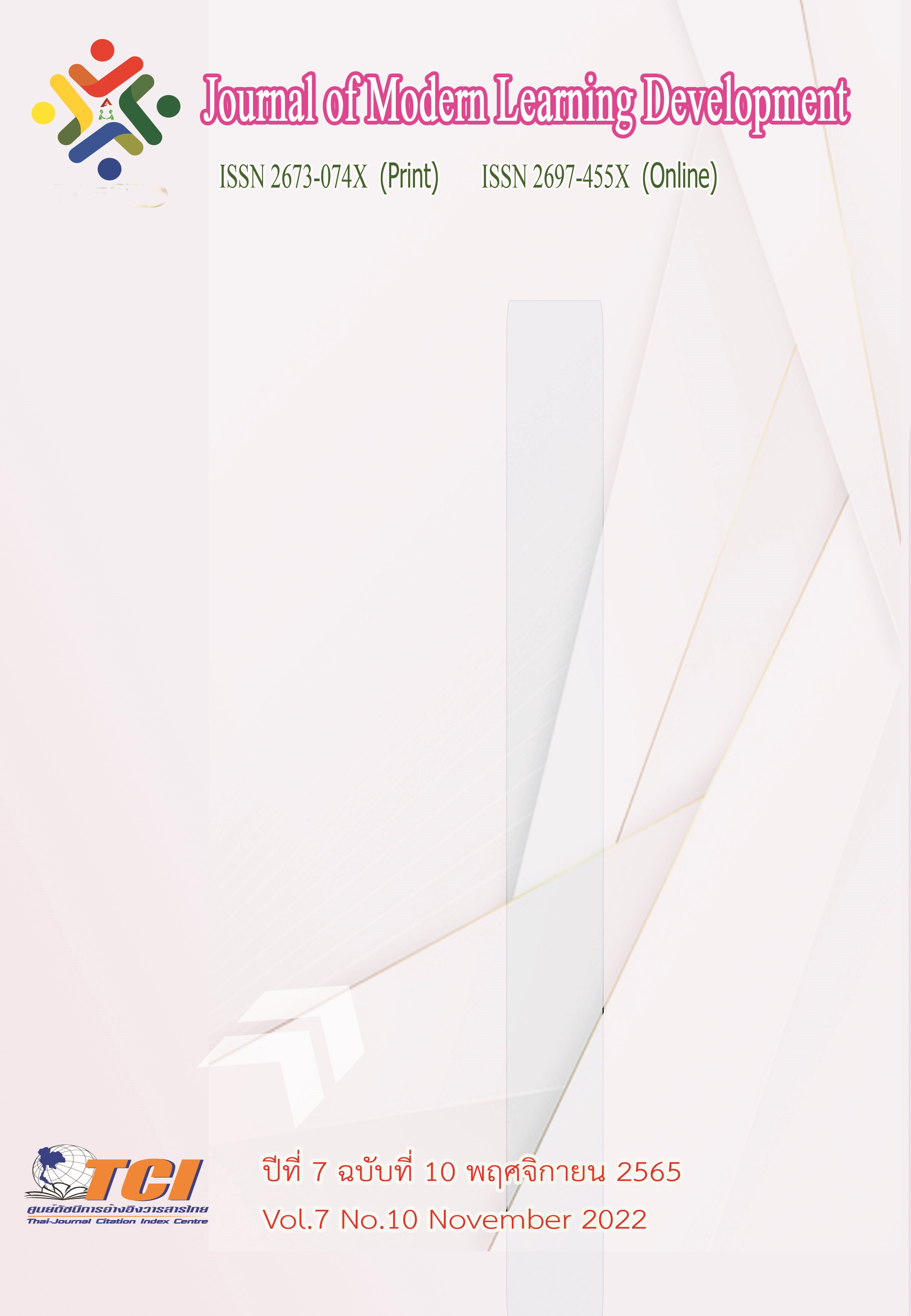Online Instructional Management In the Digital Era
Main Article Content
Abstract
The purpose of this study was to present for Online Instructional management in the digital era; teachers need to change their teaching methods after the Covid-19 crisis. Under the new lifestyle, technological advances have changed people's learning behaviours. Teachers, therefore, need to learn modern technology. In conveying content, images, and videos, using multiple media (Multimedia) in conjunction with discussion and exchange of opinions via electronic devices so that students have access to diverse learning resources and are up-to-date and able to learn on their own as needed. Instructors must be ready to manage online learning so that learners can learn stories by themselves anywhere with quality. By the content and readiness of the learners taking into account the differences of each learner, know how to teach online to be successful in learning management and developing learning and characteristics of learners in the 21st century.
Article Details
References
ชนสิทธิ์ สิทธิ์สูงเนิน. (2560). ห้องเรียนกลับด้าน : ทักษะการเรียนรู้ในศตวรรษที่ 21. วารสาร มจร สังคมศาสตร์ปริทรรศน์. 6 (2), (ฉบับพิเศษ), 171-182.
ถนอมพร เลาหจรัสแสง. (ม.ป.ป.). ทักษะแห่งศตวรรษที่ 21 เพื่อการพัฒนาอาจารย์ของมหาวิทยาลัย เชียงใหม่. ออนไลน์. สืบค้นเมื่อ 12 มิถุนายน 2565. แหล่งที่มา: http://www.pharmacy. cmu.ac.th/ unit/unit_files/files_download/2014-04-10.pdf.
เทื้อน ทองแก้ว. (2563). การออกแบบการศึกษาในชีวิตวิถีใหม่: ผลกระทบจากการแพร่ระบาด COVID-19. คุรุสภาวิทยาจารย์. 1 (2), 1-10.
ธนาคาร คุ้มภัย และคณะ. (2564). รูปแบบการจัดการเรียนการสอนออนไลน์สาขาช่างอุตสาหกรรม บนความปกติใหม่ช่วงวิกฤติโควิด–19. วารสารมหาจุฬานาครทรรศน์. 8 (3), 393-407.
นันทิยา น้อยจันทร์. (2565). ครูของครู แนะ "ครูยุคดิจิทัล" ต้องเป็นอย่างไร. ออนไลน์. สืบค้นเมื่อ 20 พฤษภาคม 2565 แหล่งที่มา: https://www.komchadluek.net/news/501304
บุญทิพย์ สิริธรังศรี. (2563). การจัดการเรียนการสอนออนไลน์สู่กรอบมาตรฐานวิชาชีพการสอนและสนับสนุนการเรียนรู้ระดับอุดมศึกษา. วารสารวิชาการราชวิทยาลัยจุฬาภรณ์. 2 (3), 1-17
ไพฑูรย์ สินลารัตน์และคณะ. (2561). คิดรับผิดชอบ : สอนและสร้างได้อย่างไร. กรุงเทพมหานคร: วิทยาลัยครุศาสตร์ มหาวิทยาลัยธุรกิจบัณฑิตย์.
วงศ์พันธ์ อมรินทร์เทวา. (2564). เพราะการศึกษาหยุดไม่ได้ ต่างประเทศเรียนกันอย่างไรในช่วงโควิด. ออนไลน์. สืบค้นเมื่อ 20 พฤษภาคม 2565 แหล่งที่มา: https://www.the101.world/education-abroad-covid/
วันเพ็ญ พุทธานนท์. (2563). New Normal การศึกษาไทยกับ 4 รูปแบบใหม่การเรียนรู้. ออนไลน์. สืบค้นเมื่อ 30 พฤษภาคม 2565. แหล่งที่มา: https://www.thebangkokinsight.com/367124/
วิจารณ์ พานิช. (2555). วิธีการเรียนรู้เพื่อศิษย์ในศตวรรษที่ 21. กรุงเทพมหานคร: มูลนิธิสดศรี–สฤษดิ์วงศ์.
วิชัย วงศ์ใหญ่ และมารุต พัฒผล. (2563). การออกแบบการเรียนรู้ใน New Normal. กรุงเทพมหานคร: มหาวิทยาลัยศรีนครินทรวิโรฒ.
สมัครสมร ภักดีเทวา และเอกนฤน บางท่าไม้. (2564). การเรียนรู้ยุคใหม่กับการเรียนการสอนออนไลน์ในสถาบันอุดมศึกษา. วารสารสุโขทัยธรรมาธิราช. 34 (1), 1-18.
สุนันท์ สีพาย และไพฑูรย์ สินลารัตน์. (2561). เปลี่ยนผ่านการศึกษาไทยสู่ การศึกษา 4.0. วารสารการวัดผลการศึกษา มหาวิทยาลัยมหาสารคาม. 24 (2), 13-27.
สุนันท์ สีพาย. (2562). การศึกษาคุณลักษณะของครูที่ดีในศตวรรษที่ 21 ในภาคตะวันออกเฉียงเหนือ. วารสารศึกษาศาสตร์ มหาวิทยาลัยมหาสารคาม. 246-263.
สำนักงานเลขาธิการสภาการศึกษา. (2562). รายงานการศึกษา เรื่อง แนวปฏิบัติของการสร้างและส่งเสริมการรู้ดิจิทัลสำหรับครู. กรุงเทพมหานคร: บริษัท พริกหวานกราฟฟิค จำกัด.
สำนักงานคณะกรรมการการศึกษาขั้นพื้นฐาน. (2563). การศึกษายุคดิจิทัล. ออนไลน์. สืบค้นเมื่อ 6 มิถุนายน 2565. แหล่งที่มา: https://www.posttoday.com/social/general/628541.
Bill, P. (2010). Three Principles of Effective Online Pedagogy. Journal of Asynchronous Learning Network, 14 (1), 103-116.
Herring, M. C. et al. (2016). Handbook of Technological Pedagogical Content Knowledge (TPACK) for Educators. (2nd Ed.). UK: Routledge.
Horn, M.B.& Staker, H. (2012). Classifying K–12 Blended Learning. Innosight Institute.
Graham, C.R.; Allen, S. & Ure , E. ( 2003 ). Blended Learning Environments: A Review of the Research Literature. [Unpublished Manuscript], Provo, UT.
Koehler, M.J. & Mishra, P. (2008). Introducing TPCK, citing in AACTE Committee on Innovation and Technology, eds. Handbook of Technological Pedagogical Content Knowledge (TPCK) for Educators. Routledge, New York; Washington, DC.
Shechtman, N., & Others. (2016). Empowering adults to thrive at work: Personal success skills for 21st century jobs: A report on promising research and practice. Chicago, IL: Joyce Foundation.


